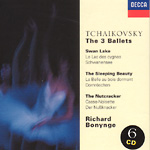When they first appeared in the 1970s, the most striking feature of these recordings was their full, rich analog sound, some of Decca’s finest from Kingsway Hall. Transfer to compact disc has opened up the sound considerably, but it also reveals a tendency to brightness (in Swan Lake) and a few audible edits not apparent on the original LPs. The main competition at the time was André Previn with the London Symphony on EMI, which boasted more stylistically cohesive readings. For his part, Richard Bonynge is nothing if not an earnest Tchaikovsky interpreter, investing his performances with great heaps of emotion. It’s just that it seems to show up in odd ways, most notably in extremes of tempo and heavy textures that at times puts audible strain on the players of the National Philharmonic.
Swan Lake suffers most from this, with many passages–Act 1’s Dance de coupes, the brass chorale, the end of Act 2’s Scene No. 11, and Act 4’s Danse des petits cygnes–sounding numbingly slow. However, he gets the familiar “Swan” scene right, and he’s one of the few conductors who lets the brass rip when it’s their turn, making it the chilling moment it should be. Bonynge’s Swan Lake takes up two discs and part of a third, making it very long indeed. Leonard Slatkin shortened his St. Louis recording by thankfully cutting some of the work’s many repeats (especially the Act 3 corps de ballet).
In Sleeping Beauty Bonynge exhibits interpretive tendencies similar to those in Swan Lake. Tempos overall tend to be slow, especially in comparison to Gergiev, and to a lesser degree, Dorati. But Bonynge is ever emphatic, coaxing his orchestra to play full out. However, those nagging oddities show up here too: the climactic lilac fairy scene in Act 1 mistakenly balances the brass so that you can barely hear the trumpets, making it sound rounded when it should be piercing, and Bonynge takes the Apotheosis exceedingly slow, making it sound like a funeral dirge.
The best performance of the lot is the Nutcracker, where for the most part Bonynge keeps his fingers out of the bowl and lets the music flow naturally. The National Philharmonic sounds happiest here, giving a generally beautiful reading. (I’m almost inclined to ignore Bonynge’s monkeying around with the dynamics in Act 2’s Enchanted Palace scene.) Overall, this collection ranges from not bad to pretty good. As far as boxed sets go, Previn, also at budget price, still is the choice competition–but his fine performances are disadvantaged by inferior recording quality. Of course you could go with Dorati’s Nutcracker (still the best) and Sleeping Beauty on two Philips Duos. Swan Lake also is available on an excellent DG Double with Ozawa and the Boston Symphony.
































